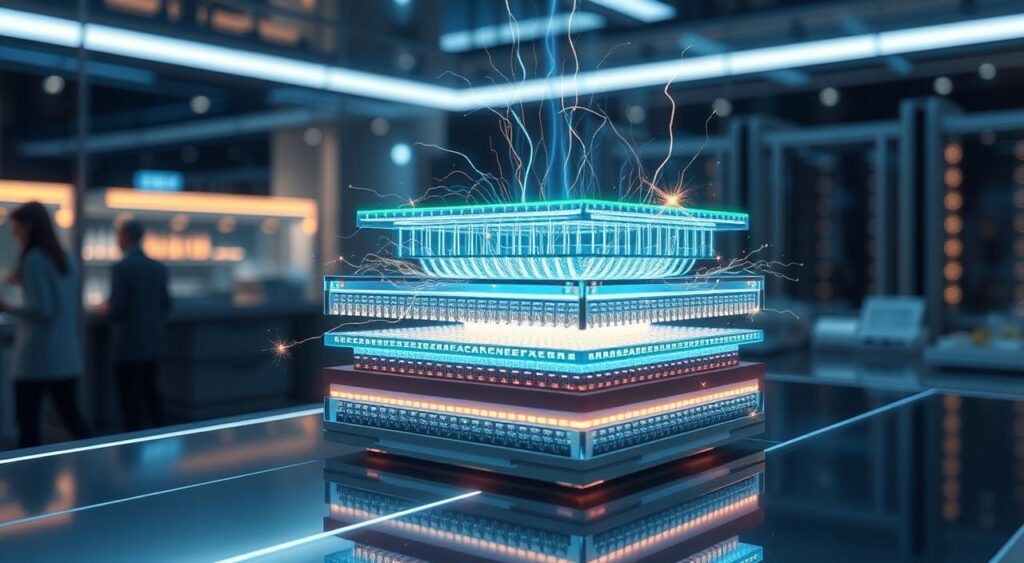Did you know a single raindrop can power 100 LED light bulbs? This shows how powerful triboelectric nano generators (TENGs) are. They can turn everyday energy into electricity.
TENGs work by changing mechanical energy into electricity. This happens through the triboelectric effect. It’s when materials get charged when they touch and then split apart. At the nanoscale, TENGs can make power from many kinds of movement. This includes the sway of a leaf or the steps of a person.
Key Takeaways
- Triboelectric nanogenerators can harvest energy from various mechanical sources, including motion, vibration, and even the impact of raindrops.
- TENGs leverage the triboelectric effect, which occurs when certain materials become electrically charged when they come into contact and then separate.
- These devices have the potential to revolutionize sustainable power generation for a wide range of applications, from wearable electronics to the Internet of Things (IoT).
- TENGs are highly scalable, versatile, and cost-effective, making them an attractive solution for the growing demand for self-powered systems.
- The development of triboelectric nanogenerators represents a significant advancement in the field of energy harvesting, with far-reaching implications for the future of sustainable energy.
Understanding Triboelectric Nano Generators
The world of energy generation has seen a big change with triboelectric nano generators (TENGs). This technology works on the cool idea of triboelectrification. It’s when materials get electrically charged when they touch and then split apart.
What is Triboelectrification?
Triboelectrification is key to how TENGs function. When two materials with different electron affinities touch and then separate, they get a static electric charge. This happens because electrons move from one material to the other. This creates a positive charge on one side and a negative charge on the other.
Principles of Nanogenerators
Nanogenerators are devices that turn mechanical energy into electrical energy at a tiny scale. TENGs use both triboelectrification and nanogenerators to make electricity from different kinds of movement, like human steps, wind, or vibrations.
The special design of TENGs lets them grab and change these mechanical energies into electricity we can use. This makes them a great option for self-powered systems and energy harvesting.
| Triboelectrification | Nanogenerators |
|---|---|
| Charge generation when two materials with different electron affinities are brought into contact and separated Positive charge on one surface, negative charge on the other Fundamental principle behind TENG operation | Devices that can convert mechanical energy into electrical energy at the nanoscale Capture and convert various forms of mechanical energy into usable electricity Enable self-powered systems and energy harvesting applications |
“Triboelectric nano generators have the potential to revolutionize the way we power our devices and systems, by harnessing the ubiquitous mechanical energy around us.”
Triboelectric Nano Generator: The Future of Energy Harvesting
Triboelectric nano generators (TENGs) are becoming key in sustainable energy. They are lightweight, flexible, and can be made in various sizes. This makes them perfect for many uses, like in wearable tech and IoT sensors.
TENGs use the triboelectric effect to make power from different sources. This includes human movement, wind, and vibrations. It’s a step towards a future where we use the environment’s energy to power our devices.
One big plus of TENGs is they turn everyday movements into electricity. This means we can use energy that’s usually lost. It helps us use less traditional power and makes energy more sustainable.
TENGs can be used in many ways, from smart clothes to big energy systems. Their ability to fit into so many areas makes them very important for sustainable tech.
“Triboelectric nano generators represent a game-changing development in the field of energy harvesting, unlocking new possibilities for sustainable and self-powered technologies.”
The triboelectric nano generator is a big step towards better energy solutions. It’s helping us move towards a future where energy is sustainable and self-powered.

Applications of Triboelectric Nano Generators
Triboelectric nano generators (TENGs) are becoming more common. They are used in wearable electronics and self-powered sensors for the internet of things (IoT).
Wearable Electronics
TENGs are exciting for wearable devices. They turn body movements into electricity. This means wearables can charge themselves, making them more convenient.
Imagine clothes that charge themselves as you move. This is the future of wearable technology.
Self-Powered Sensors
TENGs also power IoT sensors. They work without batteries or external power. This makes IoT networks more sustainable.
It also lets us put sensors in places we couldn’t before. This is great for monitoring the environment and health.
| Application | Advantages | Examples |
|---|---|---|
| Wearable Electronics | Self-charging capabilities, elimination of external power sources | Fitness trackers, smart clothing, skin-mounted devices |
| Self-Powered Sensors | Sustainable power source, expanded deployment in IoT networks | Environmental monitoring, healthcare monitoring, remote sensing |
TENGs are changing how we use energy. They are key for the future of wearable tech and IoT. They make our lives more convenient and sustainable.

Triboelectric Nano Generator: Sustainable Energy Source
Environmental Benefits
Triboelectric nano generators (TENGs) are leading the way to a greener energy future. They use the energy found in our surroundings, like our movements and wind. This method is kind to the planet, as it cuts down on the need for batteries and other power sources.
These generators bring many benefits to our environment. They turn the energy around us into electricity, reducing our reliance on fossil fuels. This means less carbon emissions and a smaller environmental impact. Plus, the materials used in TENGs are often recyclable, making them even more eco-friendly.
The world is looking for cleaner energy options, and TENGs are a key player. They tap into the energy we often overlook, offering a sustainable way to power our lives. This technology empowers us to create our own energy, reducing harm to our planet.
FAQ
What is a triboelectric nano generator?
A triboelectric nano generator (TENG) turns mechanical energy into electricity. It uses the triboelectric effect. This is when materials get charged when they touch and then split.
How do triboelectric nano generators work?
TENGs work by using the triboelectric effect at a tiny scale. When two materials touch and then separate, they get opposite charges. This is because electrons move from one to the other.
By picking the right materials and designs, TENGs can make electricity from things like our movements, wind, or vibrations.
What are the potential applications of triboelectric nano generators?
TENGs have many uses, especially in wearable tech and IoT sensors. They can be sewn into clothes or worn on the skin to make power from our movements. This makes self-charging clothes possible.
They can also power IoT devices and sensors. This means no need for batteries or other power sources.
What are the environmental benefits of triboelectric nano generators?
TENGs are good for the environment. They use energy from our surroundings, like our movements, wind, and vibrations. This is different from using fossil fuels or non-renewable resources.
Using TENGs means less need for batteries and other power sources. This helps make our future more sustainable and green.
How do triboelectric nano generators compare to other energy harvesting technologies?
TENGs have some big advantages over other energy harvesting tech. They are light, flexible, and can be made in many sizes. This makes them great for lots of uses, from wearable tech to IoT sensors.
They can also make power from many kinds of mechanical energy. This makes them a more versatile and sustainable option than traditional power sources.


Outstanding
Amazing 🤩